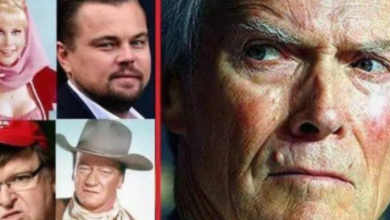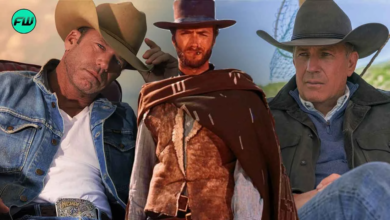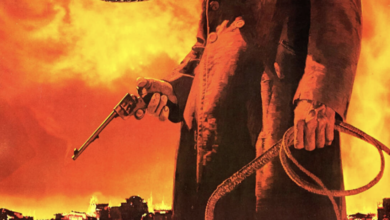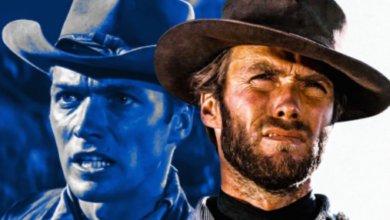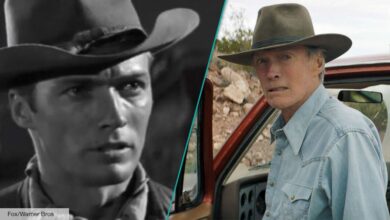The Enforcer: The very entertaining third ‘Dirty Harry’ film has lots of humor, exciting action sequences and a female partner for Clint Eastwood’s supercop
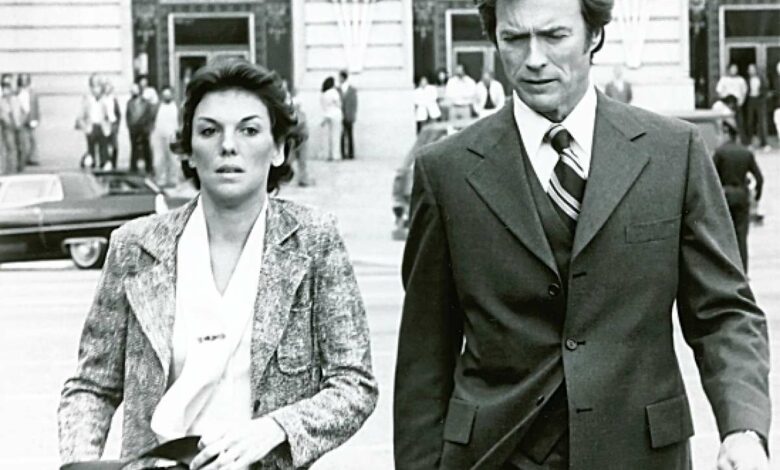
The Enforcer(1976), the third film in the ‘Dirty Harry’ series, is directed by James Fargo. The film pairs Clint Eastwood with Tyne Daly, and it contains a lot more humor along with all the elements that made the first two films great entertainment.
After incurring the wrath of his superiors for the nth time – for speaking his mind, questioning their tactics, going against their orders, using excessive force, etc. etc., Inspector Harry Callahan (Clint Eastwood) of SFPD is suspended from the force, and asked to turn in his badge (and that too in the middle of a commendation ceremony; only Harry can manage to get suspended in the middle of a commendation). Harry angrily obliges, and pulls out his badge and hands it to Capt. McKay (Bradford Dillman), with a snarky remark: Here’s a 7-point suppository, Captain!
Capt. McKay [stunned]: WHAT did you say?
Harry Callahan [angrily, clenching his teeth and rolling his eyes in typical Clint Eastwood fashion]: I said STICK IT IN YOUR ASS!
Ha ha ha………, of all the witty quips, punchiness and legendary monologues delivered by Clint Eastwood as Harry Callahan (or otherwise), this little conversation from the third “Dirty Harry” film, “The Enforcer(1976)” is the one I find the funniest. It never fails to crack me up, no matter how many times i have seen it. “The Enforcer” also happens to be the funniest of all “Dirty Harry” films. There are witty punchlines and situational humor galore(a lot of it smooth, some rather forced). “The Enforcer” is a solid entry in the “Dirty Harry” franchise, but also an odd one. Harry is still the non-nonsense, take-no-prisoners, take-no-guff-from-superiors supercop who effectively uses his Magnum 44 to end all evils in the society, but the film looks and feels pretty different from the rest of the films in the franchise, and perhaps, intentionally so. It’s more lighthearted, and hence much more entertaining than any of the other films, but artistically and thematically lightweight.

After the gritty, violent and very popular urban vigilantism of the first “Dirty Harry” in 1971- which generated a lot of controversies by the way, star\producer Clint Eastwood (and his collaborators) toned down the violence and vigilantism for the second film, “Magnum Force(1973)“- going in for a more expansive, glossy film with a relatively softer (and romantic) Harry Callahan- what with girls throwing themselves at him left, right and center. So I guess for the third film, they decided to amplify the humor quotient, and, perhaps, keeping that in mind, they have also made the alpha-male, (and casually sexist\racist) Harry’s partner a woman; Thus, turning the film into a fun buddy-cop flick. Harry’s partner is Inspector Kate Moore (Tyne Daly). Their first encounter was rather unpleasant; Harry was one of Kate’s interviewers during Harry’s stint in ‘Personnel’- Harry was transferred out of Homicide for using excessive force to resolve a hostage crisis. A seething Harry, who do not much like the presence of females in the field- more for their lack of field experience (mind you!) rather than for their gender, tried his best to intimidate, and disqualify Kate from getting the promotion, but she managed to come through. But what Harry did not expect was Kate ending up as his partner, just when he’s reassigned to Homicide. Harry’s partner, DiGiorgio (John Mitchum), was killed by a gang of urban terrorists, who calls themselves People’s Revolutionary Strike Force (PRSF), lead by Bobby Maxwell (DeVeren Bookwalter), when DiGiorgio tried to stop them from stealing M72 LAW rockets and other weapons from a warehouse. Now Harry is tasked with apprehending the gang.
The initial portions of Harry and Kate’s police work unfolds as expected, leading to much of the humor in the film. Kate, who has very little experience in fieldwork, makes a fool of herself wherever she goes- much to exasperation of Harry, who has to come to her rescue again and again: While watching an army demonstration of the LAW rocket on a firing range, Harry must abruptly yank the seemingly oblivious Kate out of the path of potentially lethal missile backfire; while visiting the Hall of Justice to sit in on an autopsy on a security guard killed in the robbery, Kate gets queasy and runs out of the room; whether chasing a suspected bomber across town, or dealing with a Black militant leader (and his followers) at his den, Kate is found wanting. But their relationship takes a turn for the better when Kate supports Harry after he’s suspended from force for not participating in a farcical ‘Commendation ceremony’ organized by a publicity-seeking Mayor (John Crawford) to commend Kate and Harry for solving the PRSF case – when the duo had’nt done anything like that. Harry had tracked the suspected bomber to militant leader, “Big” Ed Mustapha (Albert Popwell), but when he realizes that he’s not linked to PRSF, Harry makes a deal with Ed for information about the terrorist organization. And no sooner had Harry left Ed’s den, the stupid, Capt. McKay raids the place and arrest everyone, including Ed, for the crimes committed by PRSF, and pronounces that the case is solved. But McKay convinces the Mayor to give the credit for the operation to Harry and Kate, as it will bolster the Mayor’s image for promoting a female cop. An angry Harry, whose credibility with Ed was damaged on account of McKay’s actions, refuse to take part in the televised farce, and walks away turning in his badge.
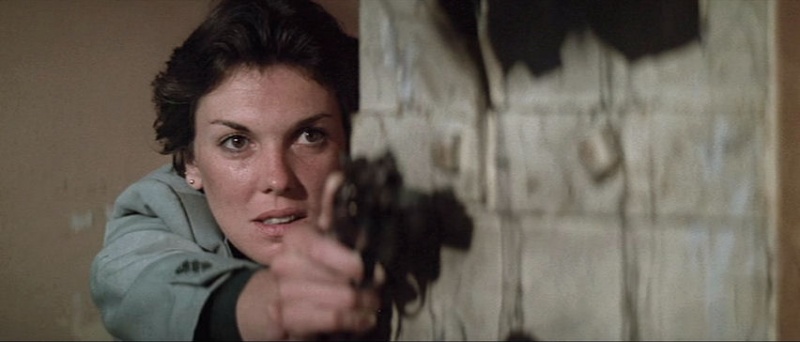
Kate too walks out with Harry, and does not join the Mayor in meeting with the journalists. Kate’s act of supporting him – risking her own position in the department – earns her Harry’s respect. The two bond over a few beers, and Kate offers (now suspended) Harry her her help in gathering information on the case; they now start working as a proper team, with Harry, finally, accepting her as an equal partner. Harry does not remain suspended much long though, as PRSF strikes again, this time kidnapping the Mayor. The city once again needs Harry, and as usual, as McKay and others decides on meeting the terrorists’ demands, Harry and Kate get to work: with the help of Ed, they trace the location of the terrorists to Alcatraz. The cop-duo mounts a surprise attack on the (formerly) prison-island, with Kate proving herself to be courageous and resourceful during the operation. She manages to locate and free the Mayor, and as she’s escorting him out of the island, she finds Harry n a perilous situation. In an attempt to warn Harry of an impending attack, Kate has to sacrifice her life- ruthlessly machine-ɡսոոеԁ down by Maxwell. A vengeful Harry pursues Maxwell to one of the watchtowers, and kills him by blowing it up with a LAW rocket. The film ends with Harry standing guard over Kate’s corpse, while in the background we hear McKay (unaware of Maxwell’s ԁеаtһ) in a helicopter (announcing via PA) agreeing to all of Maxwell’s demands.
While watching “The Enforcer,” one is amazed at how much the “Dirty Harry” film had changed in just 5 years, and in the course of 3 films. The original was one of the greatest cop\crime thrillers ever made, with the great director Don Siegel’s gritty, minimalist, neo-noir sensibilities on full display. That film was a lean, mean, intense police-procedural, which concentrated totally on a cat & mouse game played between a maverick cop and an out-of-control, Psychopathic killer. Harry’s habit of ‘breaking the rules, while obsessively pursuing criminals, is explained away by the fact that it was unavoidable while dealing with perverse criminals like “Scorpio”- actually, one of the truly great and scary villains in Crime movies. But by the time “The Enforcer” was made, the grittiness has all but vanished from the films, replaced with an extreme emphasis on making a stylish comical entertainer in the mold of “James Bond” films. The villains have become cartoonish and Harry’s bureaucratic superiors are reduced to nothing more than laughable stereotypes. Even Harry Callahan has undergone a radical change; for starters, he doesn’t even dress the way he did in the first film; this time Harry going for some cool, stylish informal wear. Harry’s individualism and maverick sensibilities are reduced to mere style statements; this is more than obvious in his introduction sequence. Like all “Dirty Harry” films, this one too gives Harry a flashy introduction, where he showcases his own brand of ‘Law enforcement’. In this case it’s a liquor-store holdup: the robbers are demanding a car with a police radio; Harry provides one by driving his squad car into the store and then ѕһootıոɡ down the robbers. The result: $14,379 in damages that’s billed to the SFPD, and Harry gets transferred to ‘Personnel’; Harry screams that Personnel “is for A-holes,” to which McKay angrily reacts that he himself served in Personnel for ten years, and Harry ԁеаԁраոѕ “Yeah”- generating the first big laugh in the movie.
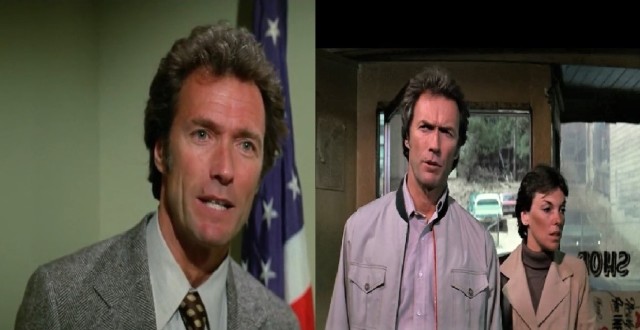
Though the film is full of highly quotable punchlines, One thing missing here is a repeating punchline, like “Go ahead, make my day” or “Do i feel lucky“. Clint says “You can count on it” a couple of times, but it’s not given the big buildup as in other films. Another thing to notice is that the relationship between Harry and Kate does not become romantic, it’s kept strictly professional, even though at the moment of her ԁеаtһ we get a feeling that their relationship would have evolved into something personal. Daly’s casting, and her performance, as the strong-minded female cop – who starts out as this timid & clumsy junior partner and then grows into a ‘women of steel’ – is the major highlight of the film. Though some of the shabby treatment meted out to Kate in the initial portion of the film would appear to reflect the mindset of those times, the film’s treatment of her is far from sexist. Her character definitely has a well-constructed arc, and it’s Harry’s ‘sexist’ and prejudiced (cannot tolerate rookie partners) mindset that’s more often criticized in the film rather than the film using an inept female-cop character to boost the image of the alpha-male cop. Kudos to Clint for casting a more believable and authentic-looking actress like Daly for the role, rather than a glamourous movie-star. Daly would have greater success playing a similar role – as Det. Mary Beth Lacey – in the television series Cagney and Lacey. Clint and Daly have great chemistry together; Clint by now was so much into the Harry Callahan role that he could play it in his sleep, and Daly gives him ample support. Kate’s character has a fetish for describing things using sexual metaphors- her thesis is that Harry uses the Magnum .44 for better penetration; while Clint plays Harry much more goofily than he has ever done (or would play it again): a scene in a brothel, where he tries to pass himself off as a sexual pervert, “Larry Dickman,” is rather out of character for Harry, but great fun to watch.
But apart from the pairing of Clint and Daly, the script, done by a team of writers lead by the great screenwriter Stirling Silliphant, is very lazy and lacks any inventiveness, except for its humor quotient. It has the most slimmest and simplest of plots in all of the series, with the film clocking in at a lean 96 minutes. The bad guy(s) too are some of the silliest in the series; they are in no way intimidating as “Scorpio” or the quartet of Vigilante-cops in “Magnum Force.” But the film has some really great action scenes- the roof-top chase where Harry and Kate pursues a suspected bomber is great, and setting the climax in Alcatraz gives texture to this San Francisco-set film. This is the only “Dirty Harry” film to be shot in Alcatraz, even though Clint would return to the island to film Don Siegel’s “Escape from Alcatraz(1979).” This is also the only “Dirty Harry” film not scored by Lalo Schifrin. In his place, Jerry Fielding provides a robust and rousing jazzy score, which is by-the numbers for a 70s cop movie. Charles W. Short’s crisp widescreen cinematography offers lots of lovely panoramic shots of the San Francisco locations, but the film does not have the gloss and slickness of previous films- it has a sort of cheap look in some portions. The film is directed by James Fargo- who was working as one of Clint’s ADs, and his direction is very basic, it’s almost like watching an episode of a TV series. He relies on Clint Eastwood’s charisma and star-power, and the wonderful character interactions between Clint and Daly to keep the momentum going. After clashing with director Ted Post on “Magnum Force,” Clint had decided to direct this film himself, but after he took over “Outlaw Josey Wales” from its original director, Philip Kaufman, Clint didn’t have enough time to prepare for this film. So he decided to elevate Fargo – who was in synch with Clint’s vision and working methods – to the director’s post. Clint would go on to direct the next installment in the franchise, “Sudden Impact(1983).” Originally, “The Enforcer” was supposed to be the final film in the “Dirty Harry” series, but after suffering some flops in the early 80s, Clint decided to resurrect “Harry Callahan” again. 1976 was a banner year for Clint: both his films, “Outlaw Josey Wales” and “The Enforcer” were big hits at the box office- in fact “The Enforcer” became Clint’s biggest hit up to that time.

